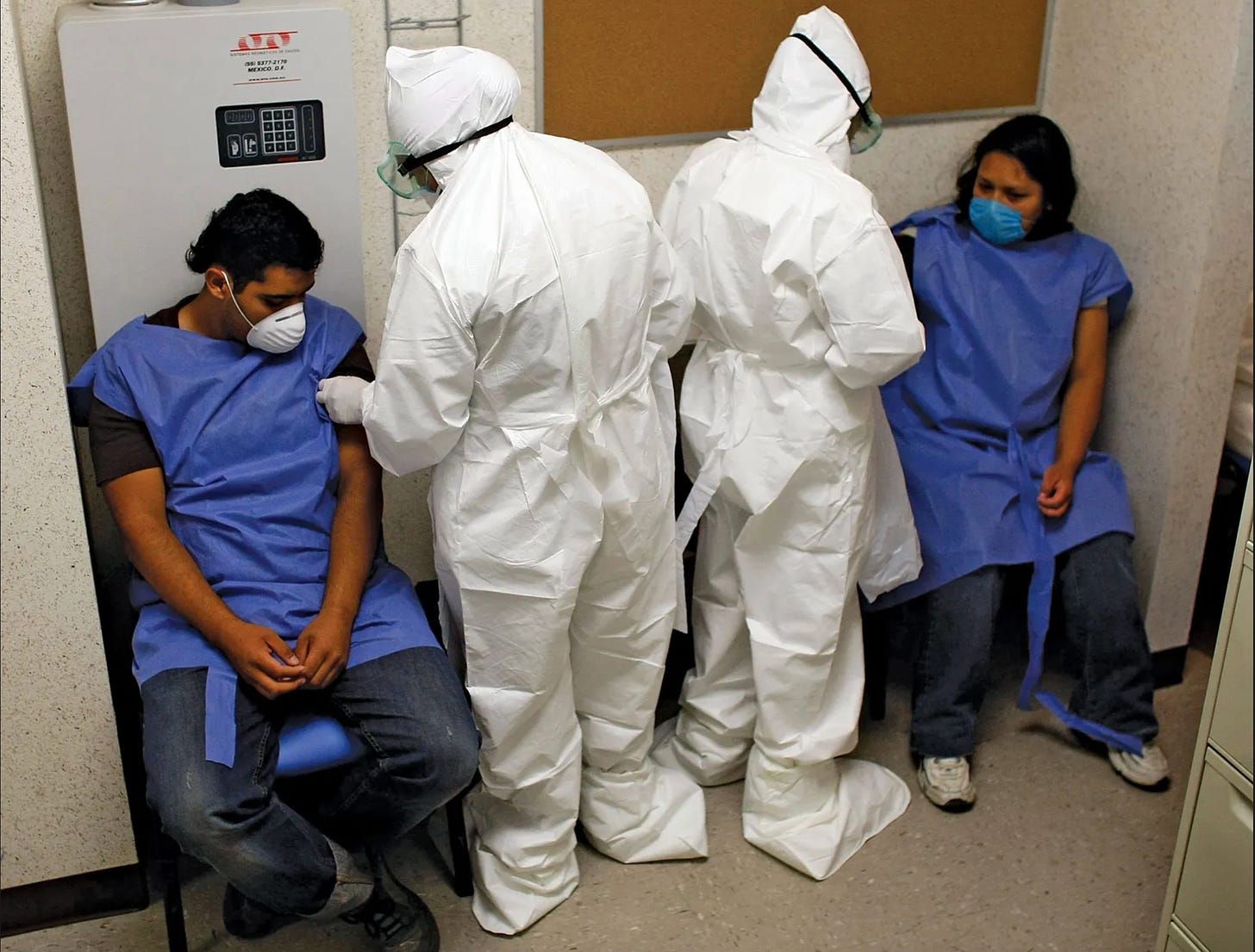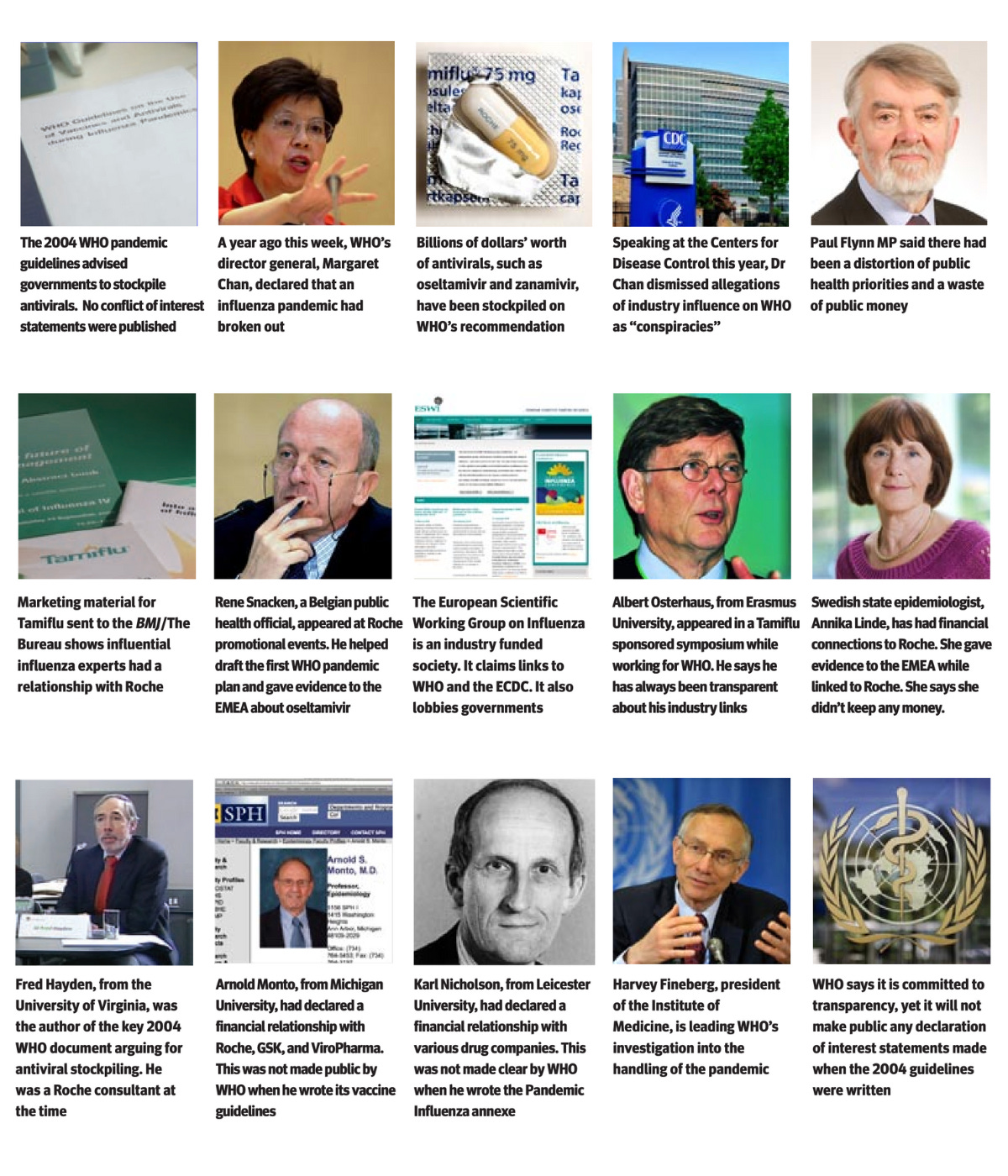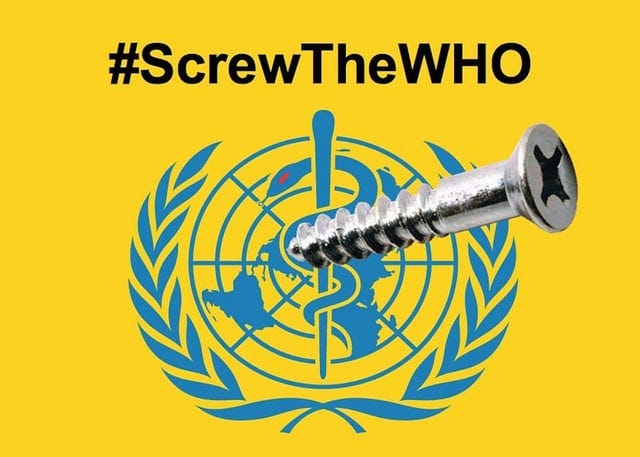The WHO and its old bag of tricks/Zahra Sethna
We never learned after the WHO pulled the trigger on a mild flu season in 2009
This week, as the world marks four years since the World Health Organization declared the coronavirus a global pandemic, we look back at a pattern that should have been heeded years ago.
[Not only did WHO change its definition of a level 6 pandemic to oblige Pharma so it could sell tens of billions of vaccine doses in 2009. WHO (then and now) employed a highly conflicted cadre of “experts” to manage both the 2009 swine flu and COVID in the most opportune way for Pharma. Drs. and Professors Fred Hayden and Arnold Monto, who concealed their conflicts back in 2009, were both instrumental in managing the false COVID narratives more recently.—Nass]
Picture this scenario: a virus begins spreading. People fall ill. The World Health Organization, responsible for global coordination of public health, kicks into action and declares a Public Health Emergency of International Concern (PHEIC). Billions of dollars change hands as countries scramble to stockpile the necessary medications and materials to protect and treat their populations.
Once the emergency passes, nations look back at how well the response was handled. Lessons are learned and shared. Criticisms and feedback include a lack of transparency around decision making, and a distortion of public health priorities. Some say huge sums of public money were wasted and the public was subjected to unjustified levels of fear. More importantly, people’s health was put at undue risk because vaccines and medications were authorized under fast-track procedures and rolled out before they had been sufficiently tested.
In the aftermath, a small but vocal cohort of people around the world allege the WHO created a fake pandemic for the benefit and profit of the pharmaceutical industry. WHO officials quickly dismiss these allegations as "conspiracies." Later, investigations reveal that key scientists who advised on pandemic planning had deep conflicts of interest with pharmaceutical firms.
Sounds like a familiar story, right? Sort of like a brief summary of the past four years?
Actually, everything described above happened 15 years ago, in 2009, during the outbreak of pandemic influenza A 2009-H1N1.
Don’t believe it? Go ahead and read the full text of a 2010 investigation in the British Medical Journal, linked in the image below.
Some of the key questions investigators Deborah Cohen and Philip Carter raised include:
whether it was appropriate for the WHO to take advice from experts who had financial and research ties with pharmaceutical companies producing antivirals and influenza vaccines
why key WHO guidance was authored by an “expert” who had received payments from the manufacturers of the two antivirals being stockpiled during the so-called pandemic
why the head of the WHO received guidance from an emergency committee whose members were kept secret from the public
Ultimately the journalists asked whether major public health organizations were able to effectively manage the conflicts of interest inherent in medical science.
Given the four-year anniversary of the WHO’s declaration of the global COVID pandemic, it’s also important to ask why so little attention was paid to this report when it came out in 2010. Perhaps if we had been paying more attention to what happens behind the scenes, we could have been more vigilant this time around.
We’re not entirely to blame, though. As usual, we have been underserved by the media watchdog. To wit: in June 2010, BBC wrote a 350-word piece on the BMJ investigation, which didn’t even include one interview, instead quoting straight from the WHO’s website. In the US, ABC News covered the story and quoted an inexplicably anonymous government source who tepidly defended the WHO’s handling of the pandemic. Why wasn’t this person able to be named?
"The WHO handled the outbreak in a very measured and appropriate manner," he said. "Their decisions were driven by the existing and evolving conditions at the time and what the best scientific information was telling us. It's very easy to look back through a 20-20 lens and essentially be an armchair quarterback."
Addressing the possibility of industry-influence on WHO's decisions, the spokesman said, "The WHO based its decisions on strong public health considerations and I don't think there was any indication from our perspective that their decisions were influenced by industry in any way."
In a better world than the one we live in, the BMJ investigation and its shocking revelations would have raised serious concerns about the WHO’s credibility and effectiveness. The troubling findings would have led to public calls for a radical shift in global health governance and maybe even a tearing down of the WHO, replacing it with something more competent, if at all.
Instead, in 2023 the world was asked to celebrate the 75th anniversary of this unaccountable, corrupt, and conflicted cabal. What we have instead of a global institution guided by principles of integrity, independence, and serving the best interests of public health is the marketing and distribution network for the pharmaceutical industrial complex.
And now, this unprincipled global institution is plotting the “next pandemic” and working on furthering the administrative and logistical trappings that will allow them and their “stakeholders” to profit handsomely through public-private partnerships while we the people sit idly by and suffer the consequences of whatever they plan to unleash.
The hope for reform of such an organization has long passed. Given the WHO’s inability to lead effectively in times of crisis, as evidenced not just by the COVID pandemic but by the 2009 H1N1 debacle, is there any other choice but to shut it down? It’s clear we cannot — and should not — trust this body, which has shown us by its actions that it puts commercial interests before public health.
It’s time for us all to wake up and start demanding change, not just for our own sake but for the sake of those generations yet to come.
and
— along with the folks at The Global Health Project and Door to Freedom — have been doing great work exposing these issues and providing tools to take action. Be sure to follow them and support their work.








Hi Meryl, Thanks for this. FYI, and per the substance of your report, I wrote this👇👀 back in early 2021.
SUBJECT: The Great #SwineFlu Swindle of 2009
ARTICLE EXTRACT (SEE LINK BELOW ⬇️): ‘In a news feature from Britain’s Channel Four from 2010, Wolfgang Wodarg, the then Council of Europe health chief, accused BigPharma of “unduly influencing World Health Organisation (WHO) decisions” and orchestrating a global “campaign of panic”. This was in response to the so-called Swine Flu (H1N1) pandemic that made its auspicious debut the year before. Bear in mind that this was at the height of the ongoing fallout from the Global Financial Crisis that came knocking the year prior, a point to which we shall return.
By the time the penny dropped several months later that this much touted existential threat to humanity was far less than the sum of its overblown parts, major European countries (Britain, France, Germany etc.), were “burdened” with tens of millions of doses of useless vaccines for which they had forked out “hundreds of millions of dollars” of the taxpayers hard-earned. That the leaders of these countries were “burdened” also by any number of burning questions as to how they’d all been bamboozled is something we’ll consider shortly.
But for now, it’s enough to say all the “grim predictions” about the virus from the hand-wringing, hoodwinking hordes in BigPharma—the Crime Cartel from Hell—and the ever reliable wolf-criers in the corporate media Greek chorus proved to be a giant ‘fizzer’. That the former though is reportedly the source of upwards of 70% of the latter’s advertising revenue may or may not be coincidental. But with the benefit of hindsight we can safely say the ‘pig-pox’ was a false flag event of the pandemic kind, presumably to soften us up for a more ambitious gambit. You know, a kind of dress rehearsal for the Big One!
Now even if one is disinclined toward such conspiratorial musing, “one” would have to at least wonder if indeed the SwineFlu was not one hell of a shell-game, albeit one played out behind a smokescreen inside a hall of mirrors. It’s a pity that so many folks seem to have ‘deep-sixed’ this sorry episode into the darkest recesses of the collective Memory Hole. Such knowledge might have stood us all in good stead in dealing with our current travails in all things pandemic related. Which is to say, does any of this ring any bells pilgrims? It should do! Are we not experiencing a palpable sense of deja vu here? We should be!
Some of the less rhetorical questions asked at the time included: Were politicians misled or were they in on the scam? Who was deciding on the nature of the risks involved and the responses? Did these decisions involve conflicts of interest? Were these ever investigated? Did BigPharma “vastly exaggerate” these risks and dangers? Was this the “pandemic” that didn’t quite “live up to” expectations, because we didn’t die according to the predictions? What can we do to prevent these types of events occurring in the future?
Insofar as I’m aware, none of these questions were ever pursued beyond asking them, much less answered. An no-one has been held accountable for the monumental cock-ups and the under-the-table deals that were done.
We can ponder these questions forever and a day, though a few answer themselves in the asking. Either way, once folks take the trip down Memory Lane afforded us by the C4 segment below (and other links herein), the answers become more apparent. Indeed, you won’t need the test results back from the laboratory folks to know there were indeed🐀in that pot of gravy back in ‘09!
But here are for what they’re worth some cogent cogitations of a ‘Covidissident’. One of the key considerations which seems to be missing throughout the Covid ‘cause célèbre’ is that of “trust”. Our blind faith for example in the media mavens is key here. In my extended rumination on all things viral from earlier this year (see link below), a central talking point of the discourse was “doubt”. Measured doubt might be viewed in this context as the halfway house between blind trust, and its polar opposite irrational paranoia, on the continuum. We’re talking here a healthy scepticism, which like our immune systems and our civil liberties is under attack.
The prevailing brouhaha over Covid and the polarising impact on us all since its arrival has derived from those on the one hand who’ve accepted (i.e. placed their trust in) the official narrative, and those who’ve rejected (i.e. completely mistrust) it, albeit with many others occupying varying positions in between these two endpoints of the continuum. By confusing and dividing us they have conquered the narrative and commandeered the public discourse to accord with their agenda. From this angle the polarisation is understandable. But we’re at a crossroads here: we cannot afford to allow these apostles of angst and animus and prophets of panic and perfidy…..?
Many concerns, questions, queries and doubts have been posited about aspects of this multi-faceted crisis. And “yes” it is a “crisis” whichever way one looks at it, though not one defined by the parameters we might ordinarily bring to bear in using such a word. The crisis exists in part because of many people’s knee-jerk willingness to accord faith-based trust in the sermons from the mount regarding all things Covid. Any rationale we might otherwise bring to bear for questioning such easy acquiescence goes begging. To wit, here’s just a few of these questions and concerns, with readers invited to come up with a few of their own:
1. Is the Coronavirus as bad as our medical authorities and political leaders and other vested interests have claimed?
2. What irrefutable scientific and medical evidence is there to actually support this premise?;
3. Have the coercive, draconian compliance measures imposed been necessary or even effective?,
4. have these same people broken the law by denying us our basic civil and human rights in enforcing them;
5. Are the soon to be mandated—directly or indirectly—yet still experimental treatments (vaccines) safe, effective, or for that matter even necessary;
6. Why has there been little public debate, and more consensus reached, about alternative responses to minimising the spread of the virus and making available alternative treatments (Ivermectin, hydroxychloroquine);
7. Why is the corporate media so determined to censor open debate about such responses and treatments, incl. the views of hundreds of medical & health science professionals;
8. Why do we continue to place so much trust in BigPharma, the media, and our political leaders when their collective track record for lying is well-documented;
9. Why should anyone believe what we are being told now about Covid-19 when the above mentioned 2009 SwineFlu pandemic was a massive global swindle?
And it perhaps is worthwhile considering that the SwineFlu (H1N1) “pandemic” that wasn’t arrived not long after of the onset of Global Financial Crisis and prevailed throughout the months-long fallout. Was this just a coincidence? Or was the SwineFlu scare a distraction from the main game? To answer this, it’s important to recall what occurred during this period: it was nothing less than the greatest transfer of wealth and property in history from the lower and middle classes to the already super rich and to the large multinational banks and corporations. And the recent crisis has similarly facilitated an even greater transfer of wealth and property to these same groups that makes the ‘09 sting pale in comparison.
An additional talking point in my essay mentioned earlier was what Carl Jung referred to as the psychic dangers of infected minds: herein it can not be denied—the “crisis” is a ‘virus’ to be sure. This has been more evident with the passage of time, with phrases like “mass psychosis”, “conditioning” and “brainwashing” becoming an increasing part of the alternative media’s and independent commentators lexicon as shorthand for explaining why so many people have bought into the official line without a greater degree of due diligence.
But getting back to trust: We’re placing an enormous level of trust in these institutions, corporations and organisations, when their past history would indicate we have very little reason to do so. Again, I refer people back to the Great Swine Flu Swindle, and a “swindle” it most definitely was. Yet, a significant proportion of the populace seem to have forgotten about this. In doing so they have once again replaced their natural tendency to doubt with a misplaced (i.e. faith-based) trust. Such levels of ‘blind faith’ would be the envy of any aspiring evangelist, con-man cum grifter or religious proselyte.
And when it comes to cynically abusing the public trust, the pharmaceutical firms are by nature recidivistic – that is they are repeat offenders, with a decades long history of corporate social irresponsibility, recklessness and grand felonious criminal conduct. No matter the number of fines and legal penalties they incur—invariably hard won by the litigants—they simply treat this as a cost of doing business. As Mike Papantonio from America’s Lawyer calls it, these people are sociopaths.
https://gregmaybury.substack.com/p/the-last-of-our-human-freedoms
Greg Maybury
Dispatches from the No Fly Zone
I remember clearly the 2009 scare. My children were in elementary school. It happened before I was skeptical and suspicious of public health organizations. I remember watching someone on the tv showing us all how to wash our hands properly to avoid infection and I had the distinct feeling that they were trying to make us all feel fearful over something that wasn’t scary in reality.
I actually asked the nurse at my children’s school what she thought about the vaccine and I will always be grateful for her wise response, “I’m not taking it” as she raised her eyebrows.
We both kind of laughed about how ridiculous all the hype was. And that was the last time I thought about it until I was watching Anthony Fauci and the CDC trying to scare us all about Covid. I thought about why people were freaking out this time compared to 2009 and in my mind the difference was the PCR testing and all the fear centered stories from the media.
The media is the most culpable in all this, in my opinion. They are completely controlled by the need to keep their main advertisers content. They could have, no, should have investigated every single thing that the public health agencies were telling everyone. Instead, the protected the public health agencies messaging from any scrutiny.
The media used to serve the people. Now they serve their advertisers. Sadly (in general), if the media people watch/read/listen to is free, and it’s not supported by viewers which means there are commercials, it means that they themselves are most likely the product being sold to industry.